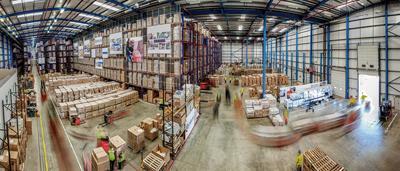
Century Logistics is earning a reputation in the logistics industry for its innovative approach to managing returns.
Sleepy Saxham in Suffolk is not exactly the sort of hotbed of logistics innovation where a company winning plaudits for maximising the value from that most thorny of retail problems – returns - might be expected to be based.
But Stephen Basey-Fisher, MD of Century Logistics, pictured, explains that the family’s logistics roots go back 200 years.
“My family were geese drovers back in the 1800s,” he says. "They raised geese in north Norfolk and walked them to London."
Farmer
Basey-Fisher was himself a farmer by trade and, after going through agricultural college, joined the family farm in Suffolk.
“When I was 21 I built my first warehouse, which was a grain store where I ended up storing about 10,000 tonnes for Associated British Foods," he says. "Then set-aside came along, where farmers were paid not to grow anything, and the bubble burst, so we had to find commercial warehousing.”
Basey-Fisher’s first contract was with a Co-operative tinning factory, storing 6 million tins of baked beans, and in 1997 he and his wife left the family farm to focus on developing their own business in Beccles near Lowestoft.
“We must have been crazy looking back on it now,” he laughs. “I started as a forklift instructor, living hand to mouth, until a year later I was asked to store a container full of poultry rings of all things. Then we started working for Bernard Matthews and became a consignment warehouse but I soon realised that to grow the business I had to gain long term contracts.”
Basey-Fisher’s big break came when he secured a warehousing contract with the world's largest baby goods manufacturer.
“That gave us a good foothold and then we went out to the marketplace and won more contracts ranging from shop fittings to toys,” he says.
Internet boom
Century has also ridden the internet boom, both in terms of handling e-fulfilment for retailers and using eBay to sell returned items.
“We were very fortunate about eight years ago as we got in early on the internet and no one realised what the power of Google could do," says Basey-Fisher. "This helped us through the recession as we had two sectors which were actually quite recession-proof. One was online and the second was nursery and baby goods.”
As a result, the company has a remarkable track record of expansion in the last decade, seeing “20% growth at least year-on-year for as long as I can remember”, says Basey-Fisher. The company now employs 200 staff, most of whom the MD knows by name. He worries about getting so big he loses the family firm ethos but believes he has plenty of scope for further growth before that happens.
Century now counts many of the top nursery and baby goods brands among its customers, and it remains strong in furniture. “We have just opened a new warehouse in Nottingham, which is all two-man deliver and build furniture,” Basey-Fisher says.
Century has also expanded its footprint, now operating eight sites totalling around 500,000sq ft, predominantly in and around East Anglia. “We see ourselves very much port-centric and Felixstowe is still the lifeblood for us,” says Basey-Fisher. “Around 80% of all our business comes out of Felixstowe so, while London Gateway will be important in 10 years’ time, Felixstowe isn't going to disappear.”
He argues that today’s super-efficient carriers means it is no longer essential to be based in the logistics ‘golden triangle’ around Lutterworth.
“The world is changing and the whole supply chain is changing,” says Basey-Fisher. “Keeping goods close to the port makes a lot more sense - why import something into the middle of the country just to distribute it to Mrs Smith, when you can keep it a lot closer to where it comes into the country and distribute it from there?"
Contract out
After trying to run his own fleet of half a dozen trucks, Basey-Fisher came to the conclusion that it was better to contract out. “I realised that working on small margins was hard work so we would be better to outsource all the haulage to good local providers," he says. “Star Transport predominantly does the full-load business but, like all logistics companies, 60% of our business is courier or single pallets, rather than dedicated full loads. Predominantly, it's part and consolidated loads.”

Most of the products handled by Century are imported in containers and the 140,000 sq ft, 15 metre-high Saxham warehouse unstuffs 10 containers a day. Basey-Fisher is seeing a trend towards manufacturing returning to Europe from the Far East.
“It's interesting how manufacturing is changing,” he says. “China is still definitely a force to be reckoned with but Eastern Europe is now coming back on the scene and we are getting far more coming in on trailers.”
But Century is far more than a conventional warehousing and distribution company.
“The warehouse is obviously bread and butter but everybody else does that so we are competing on a fairly big playing field,” says Basey-Fisher. “But when it comes to the added value we are definitely the largest and most experienced nursery goods repair centre in Britain, probably in the world. We are repairing hundreds of pushchairs and car seats every day, for the main brands in Britain.”
Handling returns has become a major headache for all retailers, whether store or internet based, with high costs for collecting and disposing of returned goods. Often, returned goods have no, or only minor, defects and can be repaired, repackaged and resold to recoup some of the lost revenue, rather than treated as waste - if managed correctly.
“We have three workshops employing about 15 engineers” says Basey-Fisher. “We started quite small just by repairing 20 pushchairs a week and now we are doing one or two hundred a day. That has been extended, so now we run customer services for three or four companies too.”
Sensitive
In such a sensitive area as nursery and baby goods, many manufacturers and retailers are wary of reselling repaired products under their own name, so Century set up its own eBay shops. Employing a dedicated team of five, over the last two years these sites have sold over 50,000 items, turning dead stock into cash.
“Returns is a really interesting marketplace to get into because there is a real bottom line profit for our customers. By selling it online you actually get a good value and, more importantly, control where the returns go. Ultimately, we are a disposal solution for our customers,” says Basey-Fisher. “We are not in the high street and we are not there to compete.
“We are certainly very keen on expanding that side of the business, as there are not many at the SME level doing what we are. We have got the scale and experience but we are still very responsive.
“The potential is just phenomenal, especially in online sales, because that's the area people still haven't really addressed. The biggest challenge for 3PLs is how to embrace it, because your average customer is doing some online sales, and some direct sales to retailers and it's hard to be an expert on both sides. To have different picking streams within a warehouse is very hard to do and that's a challenge we are all struggling with.”
Basey-Fisher is now beginning to advise some manufacturers not to start an online operation if their product range is unsuitable.
Century uses a range of carriers including APC and DPD for its small items and networks, including Palletways, for palletised traffic. While Basey-Fisher is a big fan of pallet networks and parcel carriers, he says road transport operators need to improve their offering.
“Transport is obviously key to the business and we have got to buy and manage it correctly,” he says. “Transport is still only just catching up with technology. The days of paper PoDs have really long gone, and we need it as industry standard now as the technology is out there.
“We, as 3PLs, are caught in the middle, between our customers who are getting more and more sophisticated and hauliers that are not moving at the same pace.
“We have got to have more joined-up thinking throughout the supply chain as the most important part for all consumers is still their experience of the final mile.”














